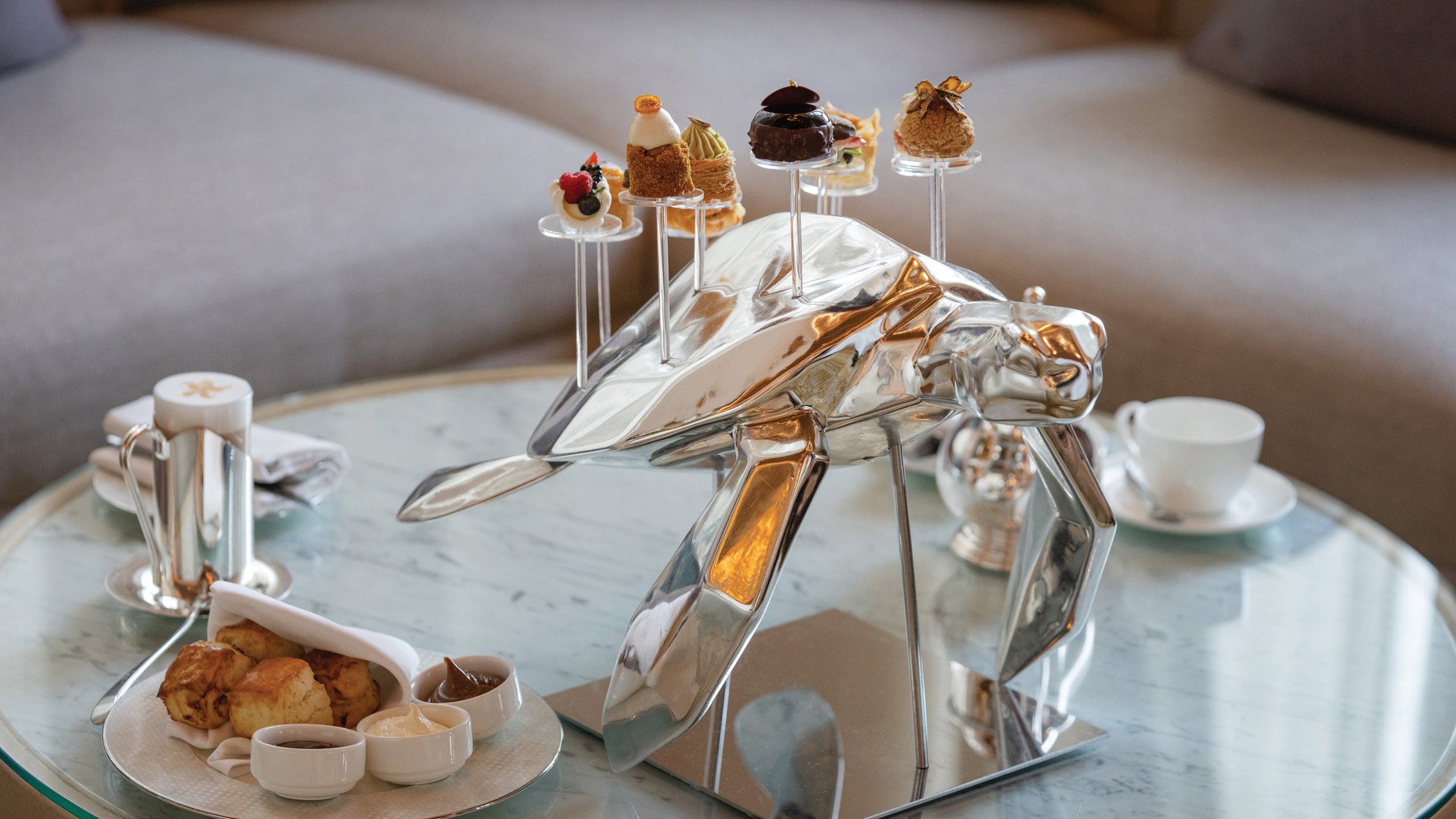Afternoon Tea with a Sea Turtle Twist
By Barbara Lang-Lenton
A display of desserts served during Turtle Tea at the Jumeirah Al Naseem’s Al Mandhar Lounge in Dubai, United Arab Emirates. Photo courtesy of Jumeirah
Glamorous afternoon teas are not uncommon in the luxury hotel scene in Dubai, United Arab Emirates. But afternoon tea at Jumeirah Al Naseem’s Al Mandhar Lounge has a special twist: Welcome to Turtle Tea, or Thé à la Mode. This special afternoon tea, designed by Jumeirah Al Naseem’s executive pastry chef, educates guests about the conservation work to rehabilitate sick and injured sea turtles spearheaded by the Jumeirah Group through its Dubai Turtle Rehabilitation Project (DTRP), which has been in operation for 20 years.
Chef Julien Jacob joined Jumeirah in June 2021, and during his first week on the job, he participated in a turtle release event honoring World Sea Turtle Day. That memorable experience inspired him to use his skills to do more to build awareness and to actively contribute to the DTRP’s outreach and education efforts. The result is a stunning collaboration between Al Mandhar Lounge and the Dubai-based French-Tunisian artist Idriss B, who is famous for creating angular, polygonal installations of wildlife such as mammoths, bears, and sharks.
The architecturally striking and iconic Burj Al Arab Jumeirah hotel is also home to large aquarium facilities. In collaboration with Dubai’s Wildlife Protection Office, and with the support of the Dubai Falcon Hospital and the Central Veterinary Research Laboratory, Burj Al Arab Jumeirah’s dedicated aquarium team founded the DTRP in 2004 to care for sick and injured sea turtles from all seven emirates. The group was established with these goals:
Chef Julien Jacob, artist Idriss B, Barbara Lang-Lenton, and H. E. Sheikh Fahim Al Qasimi (from left to right) pose in front of the Burj Al Arab. Photo courtesy of Jumeirah
Rescue, rehabilitate, and release sick and injured sea turtles.
Educate local children, citizens, and international guests about sea turtle biology and conservation.
Understand and improve sea turtle rehabilitation techniques and research turtle movements throughout the region and beyond through a satellite tracking initiative.
After intensive medical treatment at Burj Al Arab Jumeirah turtle clinic, turtle patients are transferred to a protected sea-fed turtle lagoon, the Turtle Sanctuary, at Jumeirah Al Naseem, where they complete the final phase of their rehabilitation to acclimate to ambient conditions and build their fitness levels prior to their release into the wild. Dubai residents, international hotel guests, and visitors can learn more about sea turtles and their conservation, witness their recovery, and even participate in daily educational and feeding sessions.
In addition, every year the Turtle Sanctuary receives around 2,000 schoolchildren between October and April. Local and international schools throughout the United Arab Emirates send students to learn about sea turtle biology and the threats that sea turtles and our oceans face and to witness what the DTRP and the Dubai government are doing to help. The kids also enjoy a superb breakfast, courtesy of Jumeirah Group.
To date, more than 2,100 turtles have been rescued and returned safely to the Arabian Gulf, and 77 animals have been fitted with satellite transmitters, generating helpful information about the region’s sea turtles. The project is one of the key corporate social responsibility initiatives of Jumeirah Group, and it is featured in many local and international media publications every year.
Author Affiliation
Barbara Lang-Lenton, Dubai Turtle Rehabilitation Project – Jumeirah, Dubai, UAE
This article originally appeared in SWOT Report, vol. 19 (2024). Download this article as a PDF.


